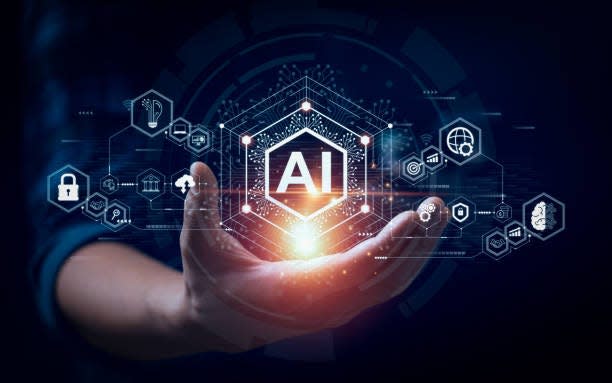Experts say artificial intelligence can bring disruption, progress to Northern Michigan
GAYLORD — Throughout history there have been transformative technologies that have had an outsized influence on our lives. In the early part of the 20th century, the development of the automobile and electricity were considered life changing.
More recently, cellphones and the internet have left an indelible imprint on the way we do business, communicate and socialize with each other. However, before we realized the benefits of these advances there was also some disruption.
For many the next transformative technology is probably already here in the form of artificial intelligence, or AI, and it too will usher in change and progress.
"I think this is a game changer. You are beginning to see some of the promise of AI and over the next few years you will see more developments," said Arun Ross, a professor in the department of computer science and engineering at Michigan State University.

Julie Hui, a professor at the school of information at the University of Michigan, agrees with Ross.
"I believe that with some of the recent advances AI can be a learning tool and it can help you do your work a lot more easily," she said.
Despite Northern Michigan's remoteness and a spread-out population, Hui and Ross believe the region should be able to benefit from this emerging technology.
First it may be instructive to explore what is artificial intelligence. Ross said artificial intelligence is the ability of a computer to reason and respond as a human might do.
"The ultimate goal of AI is to mimic human intelligence," he added.
Ross said AI is a combination of both hardware and software.
"You need to write some code to perform certain tasks and the machine automatically learns how to accomplish such a task by looking at actual data in what we call training data. Using that data, (the machine) learns the concept and then it is able to potentially provide some reasoning," Ross said.
According to Ross, much of modern AI is being developed with what are called deep neural networks. A neural network is a method in artificial intelligence that teaches computers to process data in a way that is inspired by the human brain.
"They have a structure which is reminiscent of the human brain — where you have neurons and they are connected to each other and there is some information flow from neuron to neuron which helps in making decisions," Ross said.
The AI concept has been around but recently its development has been accelerated for several reasons, including the availability of large language models (LLMs).
“You can ask it a question and it can produce elaborate answers formatted very well," noted Ross.

AI in the classroom
Ross said a rural area like Northern Michigan will be able to use AI to improve its schools.
"In education, AI can benefit students if they use it judiciously. Students can use the LLMs to learn concepts at a pace that they define. In some cases, if students don’t have access to a teacher, they can post questions to the LLMs and obtain responses. The students will also be able to think independently," he said.
Hui also believes that AI will be able to help in education but offers a warning.
"It is also creating some complications for education. Students can just ask AI to answer things for them so they might not be learning as much as they should. A big challenge is to figure out how to use AI as a support tool rather than a replacement tool," Hui said.

Like much of the content available on the internet, answers from AI must be verified.
“You don’t know if the answer the machine has produced is correct or not. So one has to be cautious. While AI holds promise for education, it also has some challenges as some students could use it for cheating where they ask LLMs for answers rather than thinking through the process," Ross said.
Hui believes that even students in elementary and junior high school will soon be able to access AI.
"If they have access to the internet, they will be able to use it maybe though something like ChatGPT, which is the most well known AI tool right now," she said.
ChatGPT, which stands for Chat Generative Pre-trained Transformer, is a language model-based chatbot (a computer program designed to simulate conversation with human users) that was launched last year by the San Francisco-based startup OpenAI.
In January, the New York City education department said it was restricting access to ChatGPT on school networks and devices because of concerns about the negative impact on student learning, as well as the safety and accuracy of the content.
Hui also said AI users will need to corroborate the information obtained through AI.
"It doesn't always give the right answer and like anything on the internet, you have to do more searching to see if it is the truth. I wouldn't believe everything it says. While AI may sound real because it is talking to you like a person, sometimes it kind of makes up an answer," she said.
Economic implications
Artificial intelligence is already being used in agriculture, a major component of the Northern Michigan economy, to increase crop production and yields “by observing various factors that impact crop growth and also being able to monitor large fields," said Ross.
AI could also further explore genetics for improved yields and resistance to diseases and drought, according to Ross, and the technology may also be used to identify pests and other threats that could affect the crop yields.
AI may also be able to aid in the development of tourism, another key segment of the Northern Michigan economy. Ross said AI may be able to by help industry officials better forecast attendance at events and what kind of services may be needed to mange an event efficiently.
Hui said AI should be able to help tourism officials produce communication materials.
"With tourism, I feel that a big part of it is communicating with people that they should come visit the area," she said. "Some of that is done with descriptions or mailing out information to potential visitors. AI could help write pamphlets or other marketing material which can be a time-consuming task for some."
Subscribe Check out our latest offers and read the local news that matters to you
One area that Northern Michigan will need to address is improving the availability and reliability of internet connections in the region.
“Internet connectivity has to be managed and good bandwidth and a good connection will be essential. With those needs met, rural areas can benefit from AI’s advances," said Ross.
He sees a role for government in meeting this challenge.
"Perhaps the government could partner with local companies to make sure internet connectivity is improved, enhanced and accessible to as many people as possible," he said.
Ross said it will be important for the government to communicate the benefits and also some of the harms that can come from AI.
"Sometimes AI systems can be biased because they are trained on certain data that may be inherently biased," he said.
— Contact Paul Welitzkin at pwelitzkin@gaylordheraldtimes.com.
This article originally appeared on The Petoskey News-Review: Experts say AI can bring disruption, progress to Northern Michigan
